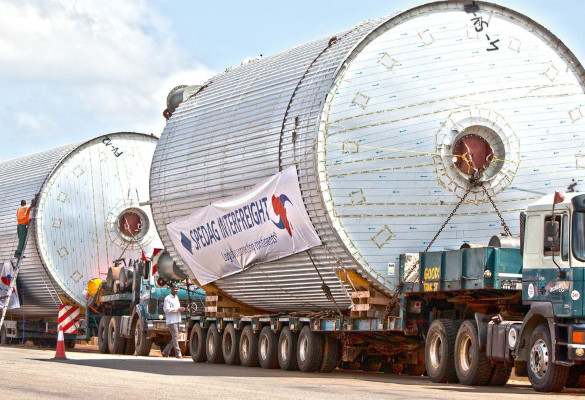French Firm Expands Presence in Region to 44 Countries
_1.jpeg)
Ceva Logistics has completed the acquisition of Africa-focussed Spedag Interfreight, a move that has expanded the breakbulk specialist’s presence in the region to 44 countries.
Ceva, a unit of France-based CMA CGM, purchased the freight forwarder from parent company M+R Spedag Group after finalizing regulatory approvals and other closing conditions.
Spedag Interfreight specializes in transporting cargo in East Africa for industries such as energy and infrastructure, aid and relief, oil and gas and commodities. Its 400 employees in Kenya, Uganda, Tanzania, Rwanda and South Sudan will join Ceva's worldwide workforce of some 98,000 people.
“Ceva Logistics remains committed to a “think global, act local” growth strategy by adding Spedag Interfreight’s local market understanding to Ceva’s leading global network,” Ceva said in a filing.
 “The company’s ambition is to make the African market account for a significant share of its revenue by 2025, and Spedag Interfreight will open new opportunities to the growth potential in East Africa.”
“The company’s ambition is to make the African market account for a significant share of its revenue by 2025, and Spedag Interfreight will open new opportunities to the growth potential in East Africa.”
CEO Mathieu Friedberg added that the acquisition was the “perfect follow-on” to the company’s organic growth and M&A activity in Africa over the last two years.
In a separate filing, Spedag Group said its focus had been to find a buyer with experience in Africa, as well as one that could secure jobs and offer financial stability.
“Ceva Logistics exceeded all these requirements,” said CEO Daniel Richner.
With its wealth of untapped natural resources and rapid population growth, Africa has been widely tipped as a major hotspot for project logistics in the coming years, although challenges such as the lack of deepwater ports and poorly-maintained inland infrastructure remain.
Kenya is the main marine gateway for East Africa, with the country’s ports authority expecting the Port of Mombasa to handle some 47 million tonnes of cargo by 2032 – a 57 percent jump on current levels.
According to Lars Greiner, associate partner for Middle East and Africa at Hamburg Port Consulting, the East Africa community is a highly organized trade zone with grand plans in place for greater integration, such as establishing customs unions and a single currency.
The executive pointed to One Stop Border Posts, a programme designed to boost trade and tourism through greater cooperation between member countries. Countries such as Rwanda and Burundi have already seen significant improvements in their ease of doing business, Greiner said.
The community was strengthened in July after it formally welcomed the DRC, a move that Greiner said would provide interesting competition for cargo entering and leaving the eastern part of the country.
Such cargo traditionally flowed from South Africa, but could now easily switch to East African ports such as Dar es Salaam.
“The region has immense potential and continues to quietly outstrip the larger and more volatile West African one with more sustainable growth,” Greiner said.
“It perhaps lacks the massive mineral deposits of the west, but more than makes up for it in human capital, with a focus across the community on an aligned education process, and agreed levels of education.”
PHOTOS: Spedag Interfreight's breakbulk operations. CREDIT: Ceva Logistics
